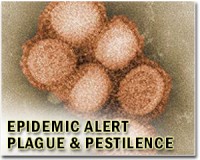| . |  |
. |
Washington (AFP) Dec 8, 2009 The H1N1 flu outbreak appears to be less severe than earlier feared, according to a new study by US health experts who found fewer than expected hospitalizations or severe complications from the virus. The British and US-funded study by researchers at the Harvard School of Public Health (HSPH), which appears online in the journal PLoS Medicine, said the swine flu pandemic appears far "milder" than anticipated. "Our work shows that the severity of the H1N1 flu may be less than initially feared," Marc Lipsitch, professor of epidemiology at HSPH and the study's senior author. "Early on, it was difficult to measure the flu's impact and it was crucial to plan for the full range of possible outcomes," he said. "Fortunately, the virus now appears to be near the milder end," said Lipsitch, who heads the Center for Communicable Disease Dynamics at the HSPH, which focuses on mathematical modeling and analysis of data of pandemic and drug resistant infections. But he stressed that it remains important to continue to vaccinate against the swine flu virus. "This is a serious disease," said Lipsitch. "The US Centers for Disease Control (CDC) and others have shown that certain high-risk groups, including pregnant women, people with asthma, and people with compromised immune systems, should be vaccinated and should seek prompt treatment if they suspect they are sick with H1N1," he said. "Even for people outside these high-risk groups, vaccination is an important way to reduce the risk of what can be a serious illness." The World Health Organization counts some 209,000 laboratory-confirmed cases and more than 3,205 deaths worldwide as of September 11, 2009, although health officials said this is likely a gross undercount. If the virus does not mutate into a more lethal illness, researchers estimate that the autumn-winter pandemic wave of H1N1 flu will probably cause a far smaller death toll than the estimated 36,000 killed in the average flu season. The study was jointly funded by the UK Medical Research Council, the UK Health Protection Agency, the US National Institutes of Health and the US Department of Homeland Security.
Share This Article With Planet Earth
Related Links Epidemics on Earth - Bird Flu, HIV/AIDS, Ebola
 Netherlands reports third mutant swine flu death
Netherlands reports third mutant swine flu deathThe Hague (AFP) Dec 8, 2009 A third patient in the Netherlands infected by a mutant strain of the swine flu virus has died, the country's health and environment institute said Tuesday. The Netherlands has seen eight cases of the mutated A(H1N1) virus, including the three fatalities, but the strain is not spreading, the institute said. "(The latest fatality) was an adult woman who was already ill," institute ... read more |
|
| The content herein, unless otherwise known to be public domain, are Copyright 1995-2009 - SpaceDaily. AFP and UPI Wire Stories are copyright Agence France-Presse and United Press International. ESA Portal Reports are copyright European Space Agency. All NASA sourced material is public domain. Additional copyrights may apply in whole or part to other bona fide parties. Advertising does not imply endorsement,agreement or approval of any opinions, statements or information provided by SpaceDaily on any Web page published or hosted by SpaceDaily. Privacy Statement |